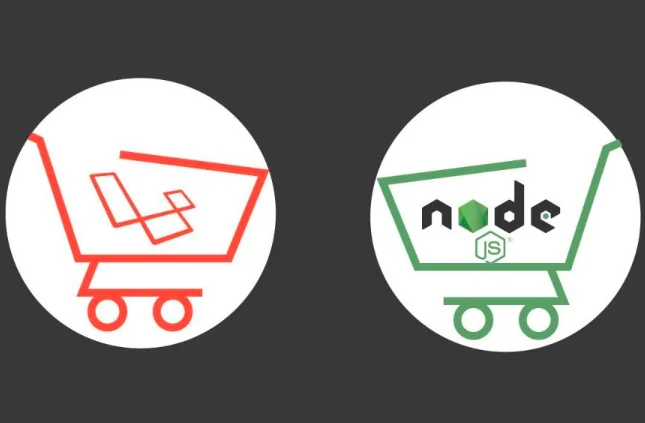In today’s rapidly evolving digital landscape, choosing the right framework for web development is crucial. Two popular options are Node.js and Laravel, each with its own strengths and use cases.
This article aims to compare Node.js and Laravel, highlighting their key features, advantages, and considerations to help you make an informed decision. Additionally, we will touch upon the Flutter vs React Native debate and explore how JayDevs fits into the framework selection process.

Understanding Node.js and Laravel
Node.js: Node.js is an open-source, cross-platform runtime environment that allows developers to build server-side applications using JavaScript. It uses an event-driven, non-blocking I/O model, making it highly scalable and efficient for handling real-time applications and APIs. Node.js is known for its lightweight and fast performance, which makes it a popular choice for building applications requiring high concurrency.
Laravel: Laravel, on the other hand, is a PHP-based web framework renowned for its elegant syntax and developer-friendly features. It follows the MVC (Model-View-Controller) architectural pattern, making it suitable for building large-scale, robust web applications. Laravel focuses on developer productivity and includes features like a powerful ORM, authentication system, caching, and routing, enabling rapid application development.
Factors to Consider
- Use Case and Project Requirements: Consider the nature of your project and its specific requirements. If you are developing a real-time application, chat app, or a streaming service, Node.js might be the better choice due to its event-driven architecture and scalability. On the other hand, if you are building a content management system (CMS) or an e-commerce platform, Laravel’s comprehensive features and MVC structure can provide a solid foundation.
- Language Familiarity: Both Node.js and Laravel have different programming languages at their core. Node.js uses JavaScript, which is widely popular and relatively easy to learn, especially if you have prior experience with frontend development. Laravel, on the other hand, uses PHP, a language well-suited for web development. Consider your team’s skills and expertise in JavaScript or PHP when making a decision.
- Ecosystem and Community Support: The strength of a framework lies in its ecosystem and community support. Node.js has a vast ecosystem of packages and libraries available through its package manager, npm, which makes it easy to integrate third-party modules into your project. Laravel, too, has a robust ecosystem with its package manager, Composer, offering a wide range of plugins and extensions. Evaluate the availability of resources and community support to ensure smooth development and troubleshooting.
- Performance and Scalability:js’ non-blocking I/O model and event-driven architecture make it highly performant, allowing it to handle a large number of concurrent connections. This makes it suitable for real-time applications that require high scalability. Laravel, although slower than Node.js in terms of raw performance, compensates with its comprehensive features, caching mechanisms, and efficient database querying. Consider the performance requirements of your project and weigh it against the trade-offs of each framework.
Flutter vs React Native: Mobile App Considerations
While discussing web frameworks, it’s worth mentioning the popular debate between Flutter and React Native for mobile app development. Flutter, developed by Google, uses Dart as its programming language and provides a rich set of UI components, enabling cross-platform development with a single codebase. React Native, backed by Facebook, utilizes JavaScript and offers a vast community and ecosystem.
When choosing between Node.js and Laravel, consider the mobile app development requirements of your project. If you aim to build native-like, highly performant mobile apps for both iOS and Android, React Native might be a better choice due to its extensive community support and rich ecosystem. Flutter, on the other hand, provides a more consistent UI experience across platforms and offers hot-reload functionality for faster development iterations.
Introducing JayDevs: A Versatile Solution In the framework selection process, it’s essential to consider tools and resources that can streamline development and enhance productivity. JayDevs is an innovative development platform that combines the power of Node.js, Laravel, Flutter, and React Native, providing a versatile solution for web and mobile app development.
With JayDevs, you can leverage the strengths of both Node.js and Laravel, utilizing Node.js for real-time APIs and server-side logic, and Laravel for building robust web applications. This hybrid approach allows you to take advantage of the best features of each framework while maintaining a seamless integration.
Moreover, when considering mobile app development, JayDevs offers the flexibility of Flutter and React Native. Whether you choose Flutter for its consistent UI or React Native for its extensive community support, JayDevs empowers you to build cross-platform mobile apps efficiently.
By adopting JayDevs, you can maximize development efficiency, streamline the learning curve, and benefit from a unified codebase, ultimately saving time and effort in your development process.
Conclusion
Choosing the right framework for your web development project is crucial to its success. Node.js and Laravel each have their own unique strengths, making them suitable for different use cases. Consider factors such as your project requirements, team’s language familiarity, ecosystem support, and performance needs when making a decision.
Additionally, take into account the mobile app development considerations, such as the Flutter vs React Native debate, and evaluate the requirements of your project to determine which framework aligns better with your goals.
JayDevs offers a versatile solution that combines the power of Node.js, Laravel, Flutter, and React Native, allowing you to leverage the strengths of each framework and streamline your development process. Explore the possibilities that JayDevs brings to the table and make an informed decision based on your project’s specific needs.
Remember, the right framework is not a one-size-fits-all solution but a tool that empowers you to build efficient, scalable, and high-performing applications. Choose wisely, and embrace the framework that aligns best with your project’s requirements and your team’s expertise.



